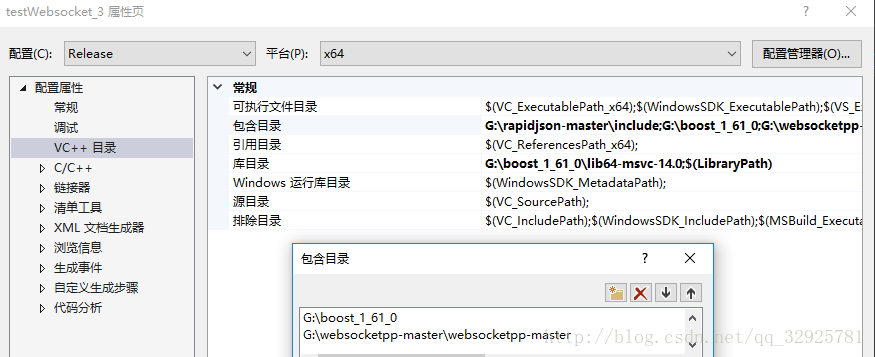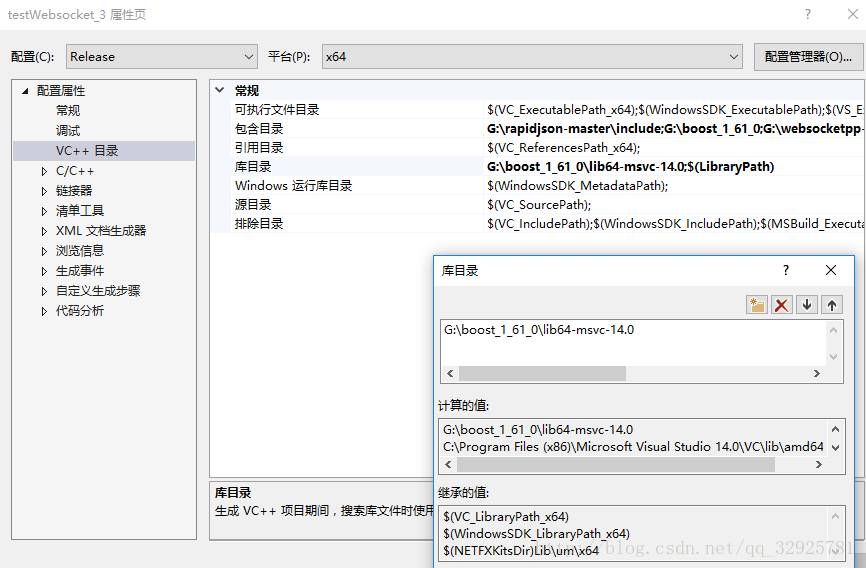简介
- 最近在做一个项目,需要在C++中通过WebSocket和服务器进行通信,但我们在C++中并不能直接使用WebSocket,于是上网搜索后发现websocket++这个库很合适。
- Websocket是基于HTTP协议的,或者说借用了HTTP的协议来完成一部分握手,并且它很好的支持了长连接,相较于ajax轮询和long poll更加节省资源。
- 具体关于WebSocket的相关知识,可以参考知乎上这篇文章:
https://www.zhihu.com/question/20215561
准备工作
-
去GitHub上下载websocket++
https://github.com/zaphoyd/websocketpp -
搭建好Boost,直接到以下网址下载编译好的,省去自己编译了(选择自己对应的ms版本,如VS2015 64位的选择boost_1_61_0-msvc-14.0-64.exe)
https://sourceforge.NET/projects/boost/files/boost-binaries/1.61.0/
配置方法
- 第一步,新建一个工程
将项目属性调整为Release x64模式,如下图所示

- 第二步,打开 项目—项目属性 窗口,选择VC++目录
在“包含目录”下添加boost和websocket++的目录,如下图所示

- 第三步,在“库目录”下添加boost的lib包目录

- 点击“应用”,然后“确定”,OK大功告成。
一个简单的WebSocket客户端
- 我们到下载的websocket++文件夹目录下的websocketpp-master\examples\echo_client中的C++代码文件拷贝出来,在工程里测试运行即可,顺便附上代码:
#include <websocketpp/config/asio_no_tls_client.hpp>
#include <websocketpp/client.hpp>
#include <iostream>
typedef websocketpp::client<websocketpp::config::asio_client> client;
using websocketpp::lib::placeholders::_1;
using websocketpp::lib::placeholders::_2;
using websocketpp::lib::bind;
// pull out the type of messages sent by our config
typedef websocketpp::config::asio_client::message_type::ptr message_ptr;
// This message handler will be invoked once for each incoming message. It
// prints the message and then sends a copy of the message back to the server.
void on_message(client* c, websocketpp::connection_hdl hdl, message_ptr msg) {
std::cout << "on_message called with hdl: " << hdl.lock().get()
<< " and message: " << msg->get_payload()
<< std::endl;
websocketpp::lib::error_code ec;
c->send(hdl, msg->get_payload(), msg->get_opcode(), ec);
if (ec) {
std::cout << "Echo failed because: " << ec.message() << std::endl;
}
}
int main(int argc, char* argv[]) {
// Create a client endpoint
client c;
std::string uri = "ws://这里附上你自己的ws地址";
try {
// Set logging to be pretty verbose (everything except message payloads)
c.set_access_channels(websocketpp::log::alevel::all);
c.clear_access_channels(websocketpp::log::alevel::frame_payload);
// Initialize ASIO
c.init_asio();
// Register our message handler
c.set_message_handler(bind(&on_message,&c,::_1,::_2));
websocketpp::lib::error_code ec;
client::connection_ptr con = c.get_connection(uri, ec);
if (ec) {
std::cout << "could not create connection because: " << ec.message() << std::endl;
return 0;
}
// Note that connect here only requests a connection. No network messages are
// exchanged until the event loop starts running in the next line.
c.connect(con);
// Start the ASIO io_service run loop
// this will cause a single connection to be made to the server. c.run()
// will exit when this connection is closed.
c.run();
} catch (websocketpp::exception const & e) {
std::cout << e.what() << std::endl;
}
}至此,我们就完成了websocket++的基本配置。
PS.如果编译器提示你 “错误:后面有::的名称一定是类名或命名空间名”或者 其他一些奇奇怪怪的错误,那多半是websocket++和boost的附加目录没有配置好
正文完